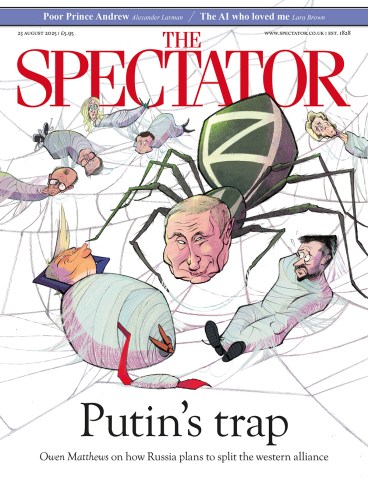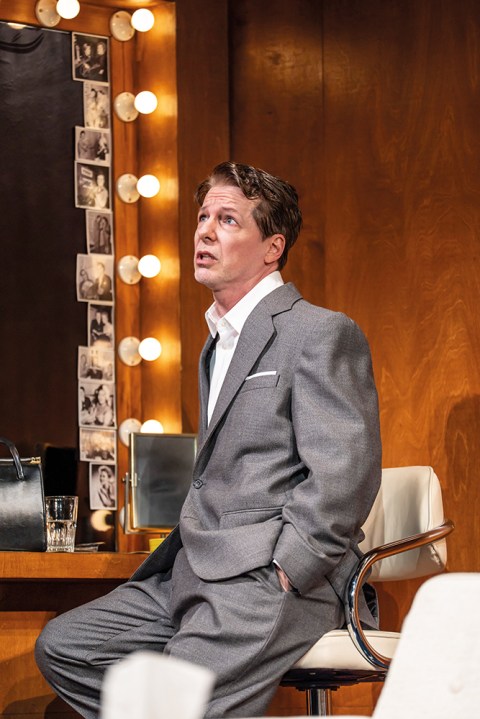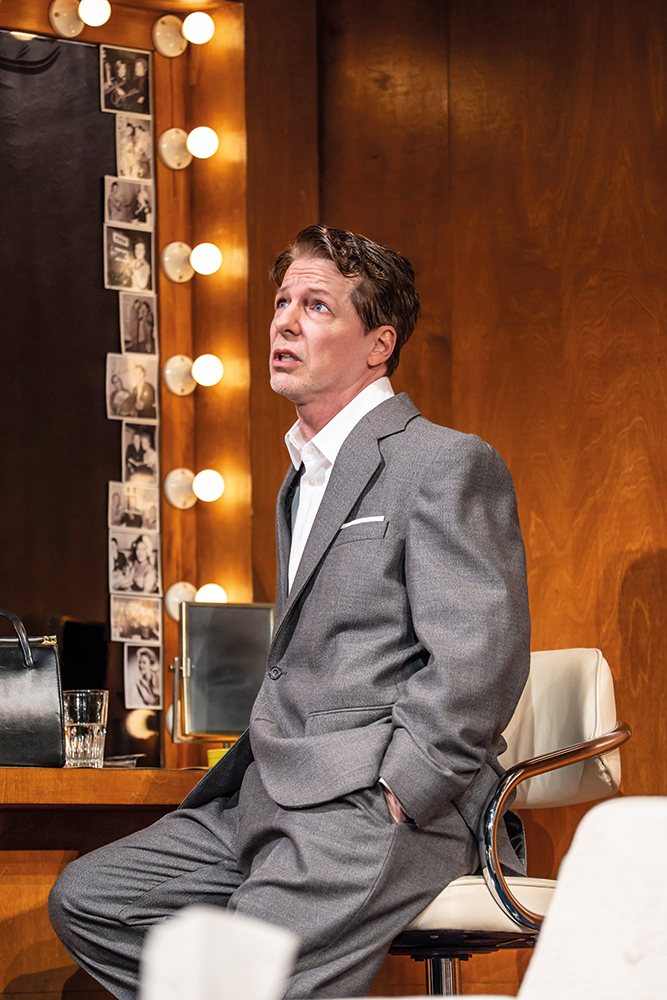
Good Night, Oscar is a biographical play about Oscar Levant, a famous pianist who was also a noted wit and raconteur. The script starts as a dead-safe comedy and it develops into a gripping battle between the forces of anarchy, represented by Oscar, and the controllers of NBC who want to censor his crazy humour.
The backstory is complicated. Oscar has been secretly committed to a mental asylum and his wife gets him released for a few hours so he can do an interview on Jack Paar’s TV show. It takes two long scenes to explain this improbable set-up but it’s worth it because Oscar (Sean Hayes) is such a lovable character. He’s a total wreck, addicted to drugs, suffering from OCD, and afflicted by aural and visual hallucinations that leave him curled up on the floor like a baby. He can’t drink a cup of coffee without stirring it clockwise and anti-clockwise eight times.
This is a rare and glorious kind of show
Although he’s treated as a star, he has no illusions about his talent. ‘Underneath this flabby exterior is an enormous lack of character,’ he says. And he finds comfort in his mental health problems. ‘Schizophrenia beats dining alone.’
Before the interview, he’s told by Bob, the network boss, that he mustn’t breathe a word about religion, politics or sex. Sure enough, Oscar breaks these rules immediately. He says that a politician is ‘a man who will double-cross that bridge when he comes to it’. And he expresses pity for Elizabeth Taylor who can’t find the right man to marry. ‘Poor Liz. Never the bridesmaid, always the bride.’
Then he oversteps the mark by making a coy reference to oral sex with Jayne Mansfield. The show goes straight to an ad break and Bob threatens to pull the interview unless Oscar behaves himself. But that’s a moral outrage. Oscar is loved because he dares to say the unsayable.
The impasse is resolved by an unexpected angel of deliverance and the story takes off in an unexpected direction. This is a rare and glorious kind of show. An easy-going comedy that has the guts to transcend its material and to gaze into the troubled heart of a creative genius. The visuals are fantastic. Rachel Hauck’s interiors are so gorgeous that you want to buy them. There are great performances from the entire cast, especially Hayes who crowns the show by displaying his sensational gifts at the keyboard.
A Role To Die For is a comedy about 007 that tackles an uncomfortable truth. Bond is boring. The movies lack suspense because the lead character has to survive every disaster and calamity. Bond is accompanied by three other characters, M, Q and Moneypenny, whose presence is guaranteed as well so it’s an ensemble piece with storylines that feel as predictable as episodes of EastEnders or The Magic Roundabout. You know the ending before the movie begins.
Bond saunters through a series of car chases, explosions and other excitements while blasting live ammo at his enemies. Every shot fired by 007 is lethally accurate and every shot aimed at him misses by a few inches. That’s lucky. And he performs these heroics while dressed as a cocktail waiter from a 1920s Cunard liner – tuxedo, bow tie and a spotless white shirt. He’s the dullest serial killer ever created. And because the movies are so stale, the real drama has shifted to the casting of the next Bond.
This is the starting point for Jordan Waller’s play which features a pair of warring cousins, Deborah and Malcolm, who control the franchise. The script is full of cynical, knowing gags. Malcolm wants his druggie stepson to work as an associate on the new movie but Deborah rules him out because of his heroin problem. ‘He’s not an addict,’ says Malcolm. ‘He’s an enthusiast.’
They reach a decision and find a perfect English hunk, named Dave, to take on the role. But as soon as Dave’s identity is released he’s accused of molestation by a teenage girl. Throngs of protestors surround Deborah’s office chanting: ‘No way, paedo Dave.’ Deborah turns to her gay son, Quinn, to find a suitable replacement. Quinn nominates a part-time actor, Theo Mackenzie, who holds a degree from Cambridge and has a polished and intelligent manner. But there are two ‘problems’ with Theo. He’s black. And he’s about to get married which will damage his status as a heartthrob.
Then comes a bombshell. Theo’s future spouse is called Luke. A gay Bond? That’s not going to work. Deborah and Malcolm deal with fallout while Quinn has to break the bad news to Theo.
The show, directed by Derek Bond, is great fun to watch and Tanya Franks has the time of her life playing the prickly and tyrannical Deborah. It’s miles better than sitting through another 007 caper but, alas, that’s not saying much.









Comments